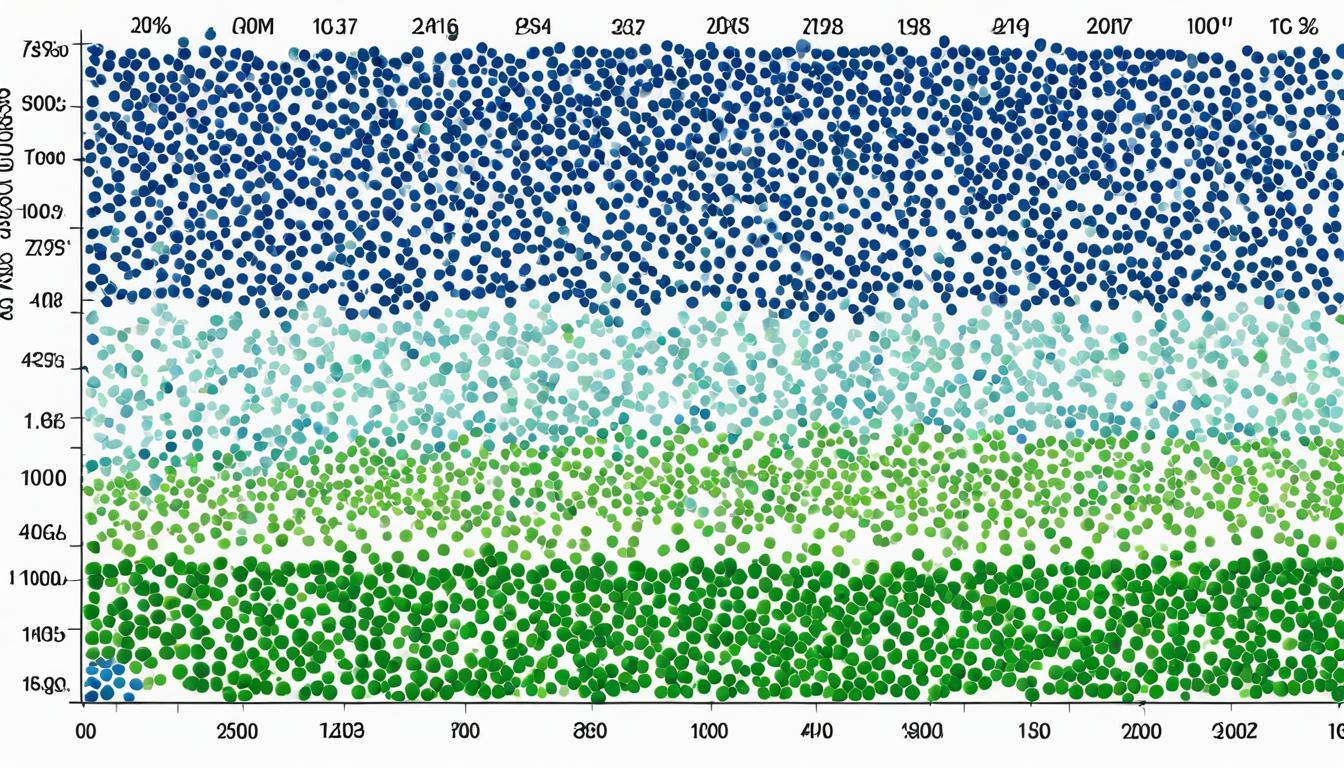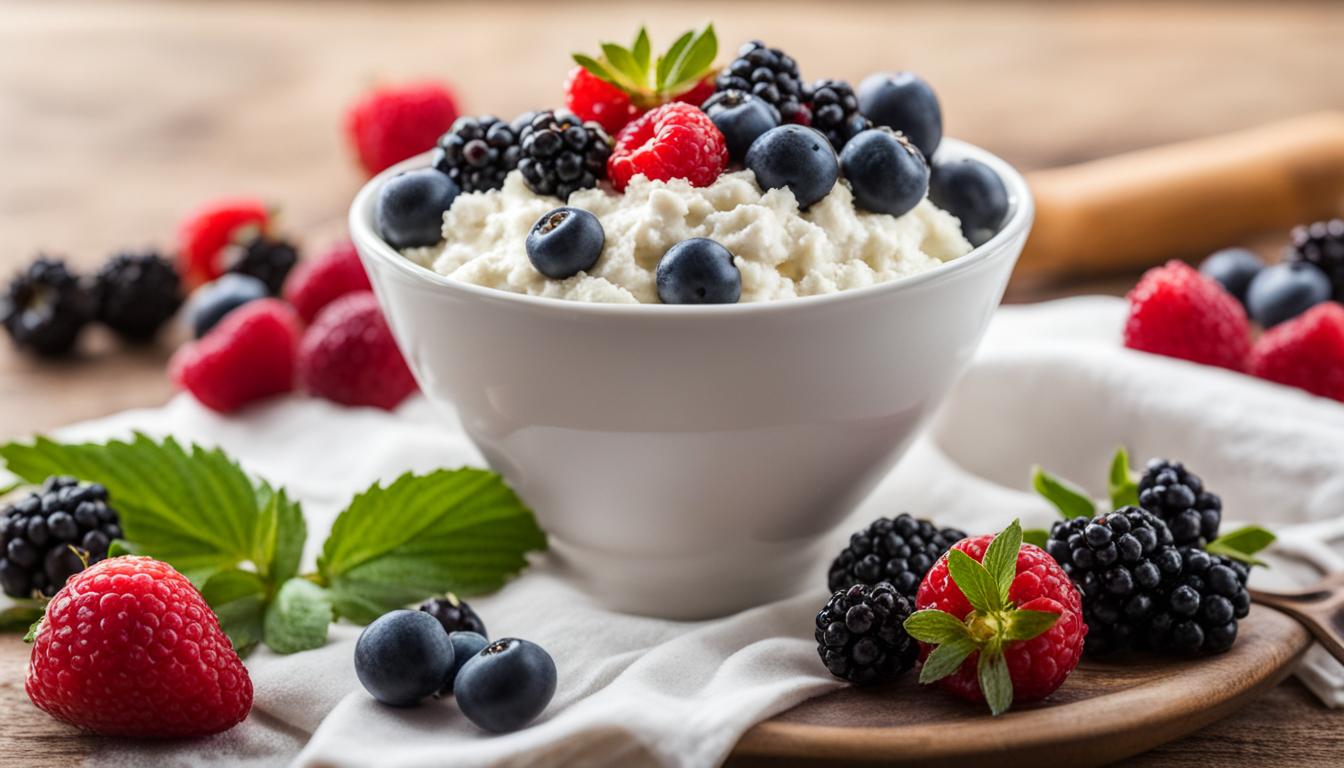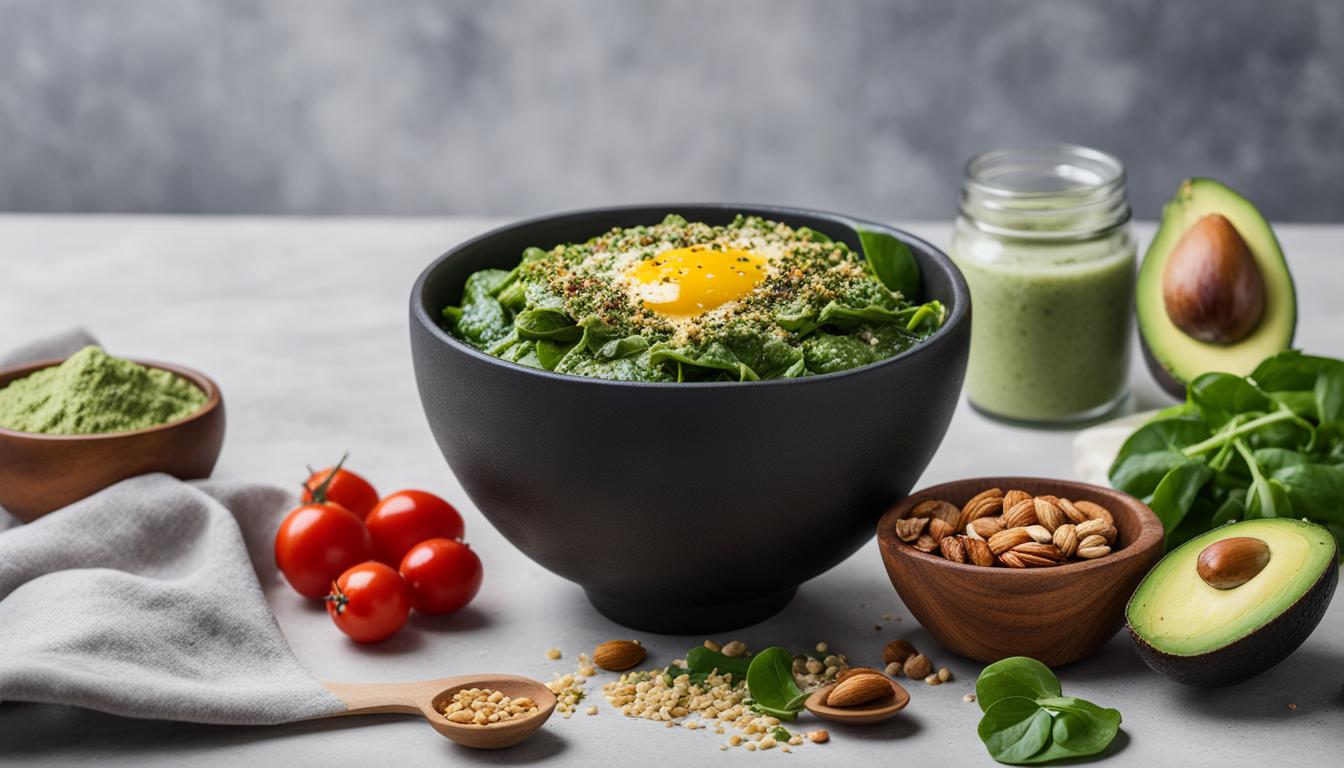Are you following a keto diet and wondering if cottage cheese can fit into your meal plan? With its creamy texture and versatility, cottage cheese is a popular dairy option for many. But is it keto-friendly?
A ketogenic diet is a low carb, high fat eating pattern that forces the body to use fat as fuel instead of carbohydrates. To stay in ketosis, it is important to limit carb intake to around 20-60 grams per day. Let’s explore whether cottage cheese can be a part of a keto diet.
Key Takeaways:
- Cottage cheese can be included in a keto diet if you choose the right varieties.
- Full fat cottage cheese with lower carb content is the best option for a keto diet.
- Cottage cheese provides high-quality protein, calcium, and can contribute to satiety.
- When incorporating cottage cheese into your keto diet, be mindful of the carb and fat content.
- Other keto-friendly cheese options include goat cheese, blue cheese, cream cheese, and parmesan cheese.
Understanding the Keto Diet and Carb Requirements
The keto diet, short for ketogenic diet, is a low carbohydrate, high fat eating pattern that aims to shift the body into a metabolic state called ketosis. In ketosis, the body primarily uses fat for fuel instead of glucose. To achieve and maintain ketosis, it is important to consume mostly fat, a moderate amount of protein, and very few carbs.
The standard keto diet typically consists of approximately 80% fat, 15% protein, and 5% carbs. However, the exact ratio may vary for individuals depending on specific needs and goals. The primary focus is on consuming high amounts of healthy fats, such as avocados, nuts, and olive oil, while keeping carb intake extremely low.
By limiting carb intake, the body is forced to rely on fat as its primary source of fuel. This metabolic shift can have a range of benefits, including weight loss, increased energy levels, and improved mental clarity. However, it is crucial to plan meals and snacks around foods that are low in carbs to stay in ketosis.
Ketosis
Ketosis is the state in which the body produces ketones, which are molecules produced from the breakdown of fat. These ketones are then used as a source of energy instead of glucose. Achieving and maintaining ketosis is at the core of a successful keto diet.
“The keto diet focuses on burning ketones, a byproduct of fat, instead of glucose for fuel.”
When the body is in ketosis, it becomes highly efficient at burning fat for energy. This can lead to significant weight loss and a decrease in overall body fat. Additionally, ketosis has been shown to have various other health benefits, including improved insulin sensitivity, reduced inflammation, and enhanced cognitive function.
However, it is important to note that the keto diet is not suitable for everyone. It is always recommended to consult with a healthcare professional or registered dietitian before making any significant dietary changes.
Carb Requirements
Carb requirements on the keto diet are typically limited to 20-50 grams of net carbs per day. Net carbs refer to total carbs minus fiber and sugar alcohols, as these do not significantly impact blood sugar levels.
By keeping carb intake low, the body is prompted to enter ketosis and utilize stored fat for energy. It is crucial to choose foods that are low in carbs but high in fat to maintain ketosis. Some examples of keto-friendly foods include:
- Avocados
- Nuts and seeds
- Fatty fish
- Eggs
- Full-fat dairy products
By focusing on these foods, individuals on the keto diet can meet their nutritional needs while staying in ketosis.
Incorporating a wide variety of low-carb, high-fat foods is key to success on the keto diet. Consistently tracking carb intake and prioritizing healthy fats will help individuals achieve and maintain ketosis for optimal results.
| Macronutrient | Percentage of Total Calories | Grams per Day (based on a 2000-calorie diet) |
|---|---|---|
| Fat | 70-80% | 156-178 grams |
| Protein | 20-25% | 100-125 grams |
| Carbohydrates | 5-10% | 25-50 grams |
Is Cottage Cheese Keto-Friendly?
Cottage cheese can be included in a keto diet as it provides a keto-friendly dairy option that is rich in nutrients. It offers high-quality protein and is a good source of calcium, making it a beneficial addition to a keto eating plan. However, it’s essential to consider the carb and fat content of cottage cheese varieties before incorporating them into a keto diet.
When choosing cottage cheese to fit a keto diet, it’s crucial to check the nutrition label for accurate information. Reduced fat or nonfat cottage cheese may contain more carbs compared to full fat varieties due to added thickeners and fruit. To ensure lower carb content, opt for plain, full fat cottage cheese when following a keto diet.
| Cottage Cheese Type | Carb Content (per 1/2 cup) | Fat Content (per 1/2 cup) |
|---|---|---|
| Full Fat Cottage Cheese | Approximately 3 grams | Varies |
| Reduced Fat Cottage Cheese | Approximately 3-5 grams | Varies |
| Nonfat Cottage Cheese | Approximately 7 grams | Varies |
It’s important to note that the values provided are approximate and may vary among different brands and products. Always refer to the specific nutrition label for accurate information.
By choosing the right cottage cheese varieties and paying attention to carb content, individuals on a keto diet can enjoy the benefits of cottage cheese without compromising their ketosis state.
Carb and Nutrition Content of Cottage Cheese
The carb content of cottage cheese can vary depending on the type and variety you choose. When following a keto diet, it’s important to be mindful of the carb count in cottage cheese to ensure it fits into your daily macronutrient goals.
For a 1/2-cup serving of cottage cheese, the carb content is as follows:
| Cottage Cheese Type | Carb Content |
|---|---|
| Full Fat Cottage Cheese | Approximately 3 grams |
| Reduced Fat Cottage Cheese | Between 3-5 grams |
| Nonfat Cottage Cheese | Around 7 grams |
| Low Fat Cottage Cheese with Added Fruit (e.g., pineapple and cherry) | 13 grams |
When selecting cottage cheese for a keto diet, it’s recommended to opt for full fat varieties with lower carb content. These options provide a good balance of fats, proteins, and fewer carbs to support ketosis and your overall nutritional needs.
Note: The carb content may vary slightly depending on the brand and specific product, so always check the nutrition label to confirm the exact values.

Cottage cheese can be a versatile and nutritious addition to a keto diet. In the next section, we will explore the best cottage cheese options that are most suitable for a keto lifestyle.
Best Cottage Cheese Options for a Keto Diet
When it comes to choosing cottage cheese for a keto diet, there are a few key factors to keep in mind. The best options are those that are keto-friendly, which means they are low in carbs and high in fat. Full fat cottage cheese is an excellent choice as it provides the creamy texture and rich flavor that you love, while also being low in carbohydrates.
Plain, full fat cottage cheese is the ideal option for a keto diet. It typically contains around 3 grams of carbs per 1/2-cup serving, making it a low carb choice to satisfy your cravings.
It’s important to avoid cottage cheese varieties that have added fruit or thickeners like guar gum or xanthan gum. These additional ingredients can increase the carb content, making them less suitable for a keto diet. Stick to plain, full fat cottage cheese to keep your carb intake in check and stay on track with your keto goals.
| Cottage Cheese Variety | Carb Content (per 1/2-cup serving) |
|---|---|
| Plain, Full Fat Cottage Cheese | Approximately 3 grams |
| Reduced Fat Cottage Cheese* | 3-5 grams |
| Nonfat Cottage Cheese | Around 7 grams |
*Reduced fat cottage cheese may have slightly higher carb content due to additional thickeners.
How to Incorporate Cottage Cheese into a Keto Diet
Cottage cheese can be a versatile and satisfying addition to a keto diet. Here are some delicious and keto-friendly ways to incorporate cottage cheese into your meals and snacks:
Create a Keto-Friendly Snack
Pair cottage cheese with low carb vegetables like celery, cucumber strips, or broccoli florets for a nutrient-packed snack. The creamy texture of cottage cheese complements the crunchiness of the vegetables, providing a satisfying and keto-friendly combination.
Make a Low Carb Dip
Blend cottage cheese with roasted red pepper, garlic powder, and dried basil to create a flavorful and low carb dip. This dip can be enjoyed with raw vegetable sticks or keto-friendly crackers for a tasty and satisfying snack option.
Enhance with Olive Oil or Olives
To increase the fat content without adding carbs, simply stir in some olive oil or add chopped olives to your cottage cheese. The addition of olive oil or olives not only adds a rich and savory flavor, but it also increases the satiety level, making cottage cheese an even more satisfying option for a keto diet.
By getting creative with cottage cheese, you can enjoy a variety of keto-friendly snacks and meals while reaping the benefits of its high protein content and essential nutrients.
The Benefits of Cottage Cheese in a Keto Diet
Cottage cheese is a valuable addition to a keto diet, providing not only protein but also important nutrients for overall health. Its high protein content makes it an excellent choice for those following a ketogenic eating plan, as protein is essential for muscle maintenance and repair.
One of the notable benefits of cottage cheese is its calcium content. Calcium is essential for maintaining strong bones and teeth, as well as aiding in muscle function and blood clotting. Incorporating cottage cheese into a keto diet can contribute to overall bone health and help prevent conditions like osteoporosis.
Cottage cheese is also a good source of vitamin B12, a vital nutrient for energy production. Vitamin B12 plays a crucial role in the formation of red blood cells and the proper functioning of the nervous system. Including cottage cheese in a keto diet ensures an adequate intake of this essential vitamin.
Research suggests that cottage cheese may have further benefits for individuals following a keto diet. It has shown potential in reducing blood sugar levels and improving insulin resistance, making it beneficial for individuals with diabetes or those looking to manage their blood sugar levels. Additionally, cottage cheese contains certain bioactive peptides that have been linked to heart health, as they may help regulate blood pressure and improve overall cardiovascular function.
Include cottage cheese in your keto diet to reap these benefits and enjoy a nutritious and satisfying dairy option.
Cottage Cheese Nutrition Facts
| Nutrient | Amount per 1/2 cup serving |
|---|---|
| Protein | 14 grams |
| Calcium | 10% of the Daily Value (DV) |
| Vitamin B12 | 20% of the DV |
These nutritional values may slightly vary depending on the brand and type of cottage cheese.

Other Keto-Friendly Cheese Options
While cottage cheese is a keto-friendly option, there are other cheeses that can be included in a keto diet. Here are some delicious choices to consider:
Goat Cheese
Goat cheese is a carb-free option that is rich in both fat and protein. It has a creamy texture and a tangy flavor, making it a versatile ingredient in salads, spreads, and stuffed meats. Enjoy it in moderation as part of your keto meal plan.
Blue Cheese
Blue cheese is a flavorful cheese with a distinctive taste. It is low in carbs, making it a great choice for snacking or adding to dishes. Use blue cheese crumbles in salads or enjoy it as a complement to grilled meats for a burst of flavor.
Cream Cheese
Cream cheese is a favorite among keto dieters due to its high fat content and creamy texture. It is a versatile ingredient and can be used in both sweet and savory dishes. Spread it on low-carb crackers or use it as a topping for keto-friendly desserts.
Parmesan Cheese
Parmesan cheese is a hard cheese that adds a salty, nutty flavor to foods without adding significant carbs. It is perfect for grating over salads, soups, or roasted vegetables. Sprinkle some grated parmesan on top of your favorite keto dishes for an extra burst of flavor.
Cheese Crisps
Cheese crisps are a convenient and low-carb snack option. They are made by baking or frying cheese until crisp. Cheese crisps come in a variety of flavors and can be enjoyed on their own or paired with keto-friendly dips. They provide a satisfying crunch without the guilt.
These keto-friendly cheese options can add variety and flavor to your meals while keeping you in ketosis. Just remember to enjoy them in moderation and include them as part of a well-rounded keto meal plan.
Cheeses to Avoid on a Keto Diet
While there are many cheese options that can be enjoyed on a keto diet, it’s important to be mindful of a few varieties that should be avoided or consumed in moderation. Here are some cheeses to watch out for:
- American cheese: Highly processed and often contains fillers and oils that can lead to inflammation. Opt for natural cheese options instead.
- Mild cheddar cheese: While still a good option, mild cheddar may not provide as much flavor satisfaction as sharp cheddar. Consider opting for sharper alternatives.
- Ricotta cheese: Higher in carbs compared to other cheese varieties, ricotta should be consumed in smaller quantities to stay within keto carb limits.
- Canned cheese: Highly processed and often contains additives and preservatives. Stick to fresh or packaged cheese options instead.
By understanding which cheeses to avoid, you can make informed choices that support a successful keto diet.
| Cheese Variety | Carb Content (per 1 oz) | Protein Content (per 1 oz) | Fat Content (per 1 oz) |
|---|---|---|---|
| American Cheese | 2g | 5g | 7g |
| Mild Cheddar Cheese | 0.5g | 7g | 9g |
| Ricotta Cheese | 1g | 6g | 5g |
| Sharp Cheddar Cheese | 0.4g | 7g | 9g |
Conclusion
After careful consideration, it can be concluded that cottage cheese is a keto-friendly option when chosen thoughtfully. By opting for full fat, low carb varieties of cottage cheese, individuals following a keto diet can enjoy its benefits while staying within their carb limits. Cottage cheese provides essential nutrients, including high-quality protein and calcium, making it a valuable addition to a well-rounded eating plan.
While cottage cheese is a suitable choice for a keto diet, it is important to be mindful of the carb content and nutritional profile of other cheese options. Not all cheeses are created equal when it comes to their compatibility with a keto lifestyle. By considering the carb content and overall composition of different cheese varieties, individuals can make informed choices that align with their dietary goals.
When incorporating cottage cheese into a keto diet, it is recommended to enjoy it in moderation and explore different ways of incorporating it into meals and snacks. Pairing cottage cheese with low carb vegetables, using it as a base for dips, or adding healthy fats like olive oil can enhance the keto-friendly aspects of this versatile dairy option.
Benefits of Cottage Cheese in a Keto Diet:
- High-quality protein source
- Good source of calcium for bone health
- Provides essential nutrients like vitamin B12
- May support blood sugar control
- Potential benefits for heart health
When it comes to enjoying cheese on a keto diet, cottage cheese is just one of the many viable options. Goat cheese, blue cheese, cream cheese, and parmesan cheese are among the keto-friendly alternatives that can be included in various dishes and snacks.
In summary, cottage cheese can be a keto-friendly choice with its low carb content, high protein content, and nutrient profile. By making informed choices and incorporating cottage cheese into a balanced meal plan, individuals can enjoy its benefits while staying in ketosis and reaching their dietary goals.
References
For further information and research on the keto diet and cottage cheese, you may find the following sources helpful:
- Healthline: Is Cottage Cheese Keto? – https://www.healthline.com/nutrition/is-cottage-cheese-keto
- Gnom-Gnom: Are Cheeses Keto? – https://www.gnom-gnom.com/are-cheeses-keto
- Everyday Health: Keto Cheese List – Top Cheeses to Eat on a Keto Diet – https://www.everydayhealth.com/ketogenic-diet/diet/keto-cheese-list-top-cheeses-eat-keto
These sources provide valuable insights and detailed information regarding the keto diet, the compatibility of cottage cheese with a keto lifestyle, and a comprehensive list of keto-friendly cheese options. Exploring these resources will allow you to make informed decisions about incorporating cottage cheese into your keto diet and help you discover other suitable cheese choices for your low-carb eating plan.
Remember, it is always beneficial to consult with a healthcare professional or registered dietitian before making any significant dietary changes or embarking on a new eating plan.
FAQ
Is cottage cheese keto-friendly?
Cottage cheese can be included in a keto diet as it provides high quality protein, calcium, and variety. However, it is important to check the nutrition label of cottage cheese varieties as they can vary in carb and fat content.
How many carbs are in cottage cheese?
The carb content of cottage cheese varies among different types. For a 1/2-cup serving, full fat cottage cheese contains approximately 3 grams of carbs, while reduced fat options range from 3-5 grams of carbs. Nonfat cottage cheese has around 7 grams of carbs.
What is the best cottage cheese option for a keto diet?
The best cottage cheese options for a keto diet are those that are full fat and have minimal additional ingredients. Plain, full fat cottage cheese with around 3 grams of carbs per 1/2-cup serving is ideal. Avoid cottage cheese varieties with added fruit or thickeners like guar gum or xanthan gum, as they can increase the carb content.
How can I incorporate cottage cheese into a keto diet?
You can enjoy cottage cheese as a keto-friendly snack by pairing it with low carb vegetables like celery, cucumber strips, or broccoli florets. It can also be used as a base for a low carb dip by blending it with roasted red pepper, garlic powder, and dried basil. To increase the fat content without adding carbs, stir in some olive oil or chopped olives.
What are the benefits of cottage cheese in a keto diet?
Cottage cheese is not only a source of protein but also provides important nutrients for overall health. It is high in calcium, which promotes bone health and can help prevent osteoporosis. Cottage cheese is also a good source of vitamin B12, which is essential for energy production. Research suggests that cottage cheese can aid in reducing blood sugar levels, insulin resistance, and promote heart health.
Are there other keto-friendly cheese options?
Yes, there are other cheese options that can be included in a keto diet. Some keto-friendly cheeses include goat cheese, blue cheese, cream cheese, Parmesan cheese, and cheese crisps.
What cheeses should I avoid on a keto diet?
Some cheeses that should be avoided or consumed in moderation on a keto diet include canned cheese, American cheese, mild cheddar cheese, and ricotta cheese.


